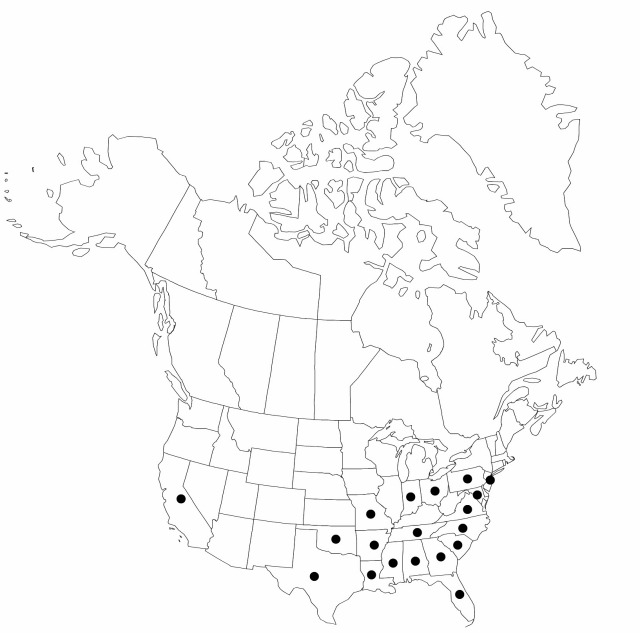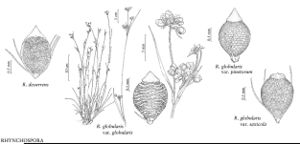Difference between revisions of "Rhynchospora globularis var. globularis"
FNA>Volume Importer |
imported>Volume Importer |
||
| (6 intermediate revisions by 2 users not shown) | |||
| Line 1: | Line 1: | ||
{{Treatment/ID | {{Treatment/ID | ||
|accepted_name=Rhynchospora globularis var. globularis | |accepted_name=Rhynchospora globularis var. globularis | ||
| − | |accepted_authority= | + | |accepted_authority= |
|publications= | |publications= | ||
| + | |special_status={{Treatment/ID/Special_status | ||
| + | |code=F | ||
| + | |label=Illustrated | ||
| + | }} | ||
|basionyms= | |basionyms= | ||
|synonyms={{Treatment/ID/Synonym | |synonyms={{Treatment/ID/Synonym | ||
|name=Rhynchospora globularis var. obliterata | |name=Rhynchospora globularis var. obliterata | ||
| − | |authority= | + | |authority= |
| − | }}{{Treatment/ID/Synonym | + | |rank=variety |
| + | }} {{Treatment/ID/Synonym | ||
|name=Rhynchospora obliterata | |name=Rhynchospora obliterata | ||
| − | |authority= | + | |authority= |
| + | |rank=species | ||
}} | }} | ||
|hierarchy=Cyperaceae;Rhynchospora;Rhynchospora globularis;Rhynchospora globularis var. globularis | |hierarchy=Cyperaceae;Rhynchospora;Rhynchospora globularis;Rhynchospora globularis var. globularis | ||
| Line 25: | Line 31: | ||
|elevation=0–300 m | |elevation=0–300 m | ||
|distribution=Ala.;Ark.;Calif.;Fla.;Ga.;Ind.;La.;Md.;Miss.;Mo.;N.J.;N.C.;Ohio;Okla.;Pa.;S.C.;Tenn.;Tex.;Va.;West Indies (Antilles);Central America. | |distribution=Ala.;Ark.;Calif.;Fla.;Ga.;Ind.;La.;Md.;Miss.;Mo.;N.J.;N.C.;Ohio;Okla.;Pa.;S.C.;Tenn.;Tex.;Va.;West Indies (Antilles);Central America. | ||
| − | |discussion=<p>Rhynchospora globularis var. globularis is the most common of the three varieties sharing habitat, particularly disturbed ones, over much of its range with the similarly ubiquitous R. recognita. The differences between the two, once considered co-variants, are striking. Rhynschospora globularis var. globularis shows slender, mostly radiately spreadingascending, lax, comparatively shortleaved culms; its sparser, less leafybracteate clusters have smaller, rounder, darker spikelets. Associated R. recognita is obviously taller, stouter, stiffer, and longer-leaved; its dense spikelet clusters are bristly with exserted-tipped subulate bracts; its spikelets are longer in narrower outline; and it is distinctively red-brown, almost orangebrown.</p> | + | |discussion=<p><i>Rhynchospora globularis </i>var.<i> globularis</i> is the most common of the three varieties sharing habitat, particularly disturbed ones, over much of its range with the similarly ubiquitous <i>R. recognita</i>. The differences between the two, once considered co-variants, are striking. Rhynschospora globularis <i></i>var.<i> globularis</i> shows slender, mostly radiately spreadingascending, lax, comparatively shortleaved culms; its sparser, less leafybracteate clusters have smaller, rounder, darker spikelets. Associated <i>R. recognita</i> is obviously taller, stouter, stiffer, and longer-leaved; its dense spikelet clusters are bristly with exserted-tipped subulate bracts; its spikelets are longer in narrower outline; and it is distinctively red-brown, almost orangebrown.</p> |
|tables= | |tables= | ||
|references= | |references= | ||
| Line 34: | Line 40: | ||
-->{{#Taxon: | -->{{#Taxon: | ||
name=Rhynchospora globularis var. globularis | name=Rhynchospora globularis var. globularis | ||
| − | + | |authority= | |
| − | |authority= | ||
|rank=variety | |rank=variety | ||
|parent rank=species | |parent rank=species | ||
| Line 48: | Line 53: | ||
|publication title= | |publication title= | ||
|publication year= | |publication year= | ||
| − | |special status= | + | |special status=Illustrated |
| − | |source xml=https:// | + | |source xml=https://bitbucket.org/aafc-mbb/fna-data-curation/src/2e0870ddd59836b60bcf96646a41e87ea5a5943a/coarse_grained_fna_xml/V23/V23_400.xml |
|genus=Rhynchospora | |genus=Rhynchospora | ||
|species=Rhynchospora globularis | |species=Rhynchospora globularis | ||
Latest revision as of 21:40, 5 November 2020
Plants mostly 30–50 cm. Spikelets dark brown, nearly globose to ovoid, mostly 2 mm. Flowers: perianth bristles rarely extending past fruit midbody. Fruit body distinctly transversely wavyrugose, intervals of fine or coarse, vertically rectangular alveolae; tubercle low-conic, distinctly narrower than rounded summit of fruit body.
Phenology: Fruiting spring–early fall.
Habitat: Sands and peats of low meadows, stream banks, natural and artificial low clearings, moist clearcut areas, and savannas
Elevation: 0–300 m
Distribution

Ala., Ark., Calif., Fla., Ga., Ind., La., Md., Miss., Mo., N.J., N.C., Ohio, Okla., Pa., S.C., Tenn., Tex., Va., West Indies (Antilles), Central America.
Discussion
Rhynchospora globularis var. globularis is the most common of the three varieties sharing habitat, particularly disturbed ones, over much of its range with the similarly ubiquitous R. recognita. The differences between the two, once considered co-variants, are striking. Rhynschospora globularis var. globularis shows slender, mostly radiately spreadingascending, lax, comparatively shortleaved culms; its sparser, less leafybracteate clusters have smaller, rounder, darker spikelets. Associated R. recognita is obviously taller, stouter, stiffer, and longer-leaved; its dense spikelet clusters are bristly with exserted-tipped subulate bracts; its spikelets are longer in narrower outline; and it is distinctively red-brown, almost orangebrown.
Selected References
None.
